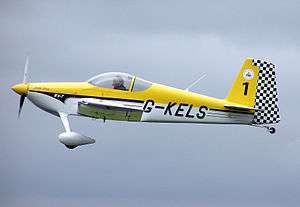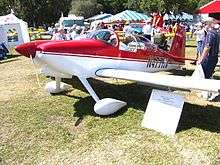Van's Aircraft RV-7
| RV-7 | |
|---|---|
 | |
| Role | RV-7 |
| Manufacturer | Van's Aircraft |
| Designer | Richard VanGrunsven |
| First flight | 2001[1] |
| Introduction | 2001 |
| Number built | 1394 (November 2014)[2] |
| Unit cost | |
| Developed from | Van's Aircraft RV-6 |


.jpg)
The Van's RV-7 and RV-7A are two-seat, single-engine, low-wing homebuilt airplanes sold in kit form by Van's Aircraft. The RV-7 is the tail-wheel equipped version, while the RV-7A features a nose-wheel.[4]
The RV-7 is the replacement for the RV-6 and is externally similar to the earlier model, with longer wings, larger fuel tanks and a larger rudder to improve spin recovery characteristics.[5]
Development
The designer of the Van’s aircraft line, Richard VanGrunsven, designed the RV-7 series as a replacement for the RV-6. The RV-6 itself was a two-seat side-by-side development of the RV-4, which was, in turn, a two-seat version of the single seat RV-3.[6]
The RV-7 incorporated many changes as a result of lessons learned over the years in producing over 2,000 RV-6 kits. The RV-7 airframe will accept larger engines, including the Lycoming IO-360, up to 200 hp (149 kW). The RV-7 also has increased wingspan and wing area over the RV-6, as well as more headroom, legroom and an increased useful load. The RV-7 carries a total of 42 US gallons of fuel, up from 38 US gallons on the RV-6.[6]
The RV-7 shares many common parts with the RV-8 and RV-9 which reduces production costs. The RV-7 also uses computer assisted design to produce a kit with pre-punched rivet holes, thus greatly reducing assembly time for the builder. Construction time is estimated at about 1500 hours for an average builder.[3]
The RV-7A version features a hardened, solid steel nose wheel strut that fits into a tube welded to the engine mount. As in all nose-wheel equipped RV aircraft, the nosewheel is free castering and the aircraft is steered with differential braking, or rudder at higher taxi speeds. The brakes are conventional toe brakes.
By November 2014, 1394 RV-7s and RV-7As had been completed and were flying.[2]
Pricing
As of December 2016, the price of the "standard build" RV-7 kit was US$22,910 and the "quick-build" kit US$34,350.[7]
In 2008 Van's claimed that most builders can complete their RV-7 projects for between US$41,000 – $97,000.[3] In 2016, Van's estimated the completion cost at between US$55,500 and US$116,000. However, Van's cautioned these numbers were estimates only, as costs vary significantly based on installed equipment and finishing.[8]
Specifications (RV-7)
Specifications are given for 200 hp, IO-360 configuration with a Hartzell constant speed propeller
General characteristics
- Crew: one pilot
- Capacity: one passenger
- Length: 20 ft 4 in (6.26 m)
- Wingspan: 25 ft (7.70 m)
- Height: 5 ft 10 in (1.79 m)
- Wing area: 121 ft² (11.2 m²)
- Empty weight: 1,114 lb (504 kg)
- Loaded weight: 1,800 lb (815 kg)
- Max. takeoff weight: 1,800 lb (815 kg)
- Powerplant: 1 × Lycoming O-320 or Lycoming O-360 constant speed or fixed pitch, 160 to 200 hp (119 to 149 kW)
Performance
- Never exceed speed: 230 mph (368 km/h, 199 kn)
- Maximum speed: 217 mph at sea level (351 km/h, 190 kn)
- Range: 765 statute miles at cruise 75% power at 8,000 ft (1,239 km / 665 nmi at cruise 75% power at 2,500 m)
- Service ceiling: 22,500 ft (6,900 m)
- Rate of climb: 1,900 ft/min (9.7 m/s)
- Wing loading: 14.8 lb/ft² (75 kg/m²)
See also
- Related development
- Aircraft of comparable role, configuration and era
References
- ↑ Van's Aircraft (2008). "Introduction – About RV Kitplanes". Retrieved 2008-09-21.
- 1 2 Vans Aircraft (5 April 2013). "First Flights". Retrieved 5 April 2013.
- 1 2 3 Kitplanes Staff: 2008 Kit Aircraft Directory, page 77, Kitplanes Magazine December 2007 Volume 24, Number 12, Belvior Publications, Aviation Publishing Group LLC.
- ↑ Vandermeullen, Richard: 2011 Kit Aircraft Buyer's Guide, Kitplanes, Volume 28, Number 12, December 2011, page 74. Belvoir Publications. ISSN 0891-1851
- ↑ Vans Aircraft (June 2002). "Service Bulletin SB02-6-1" (PDF). Retrieved 2013-08-04.
- 1 2 Bayerl, Robby; Martin Berkemeier; et al: World Directory of Leisure Aviation 2011–12, page 125. WDLA UK, Lancaster UK, 2011. ISSN 1368-485X
- ↑ Van's Aircraft (December 2016). "Kit Prices and Lead Times". Retrieved 2016-12-15.
- ↑ Van's Aircraft (December 2016). "Cost Estimator". Retrieved 2016-12-15.
External links
| Wikimedia Commons has media related to Van's Aircraft RV-7. |